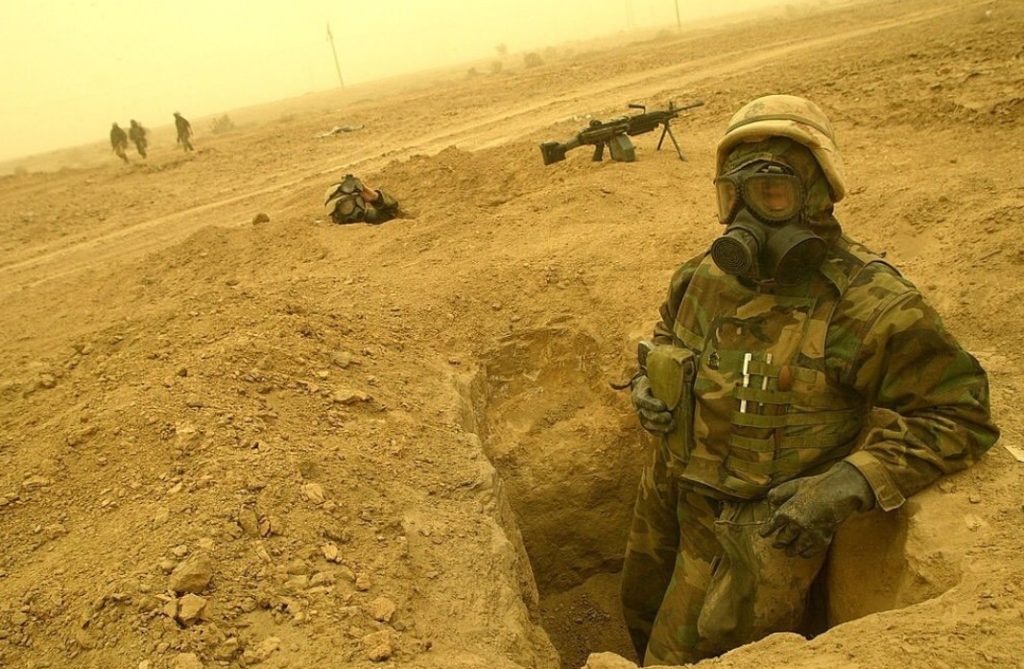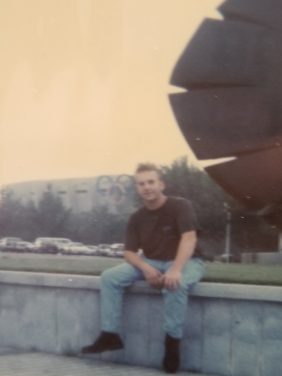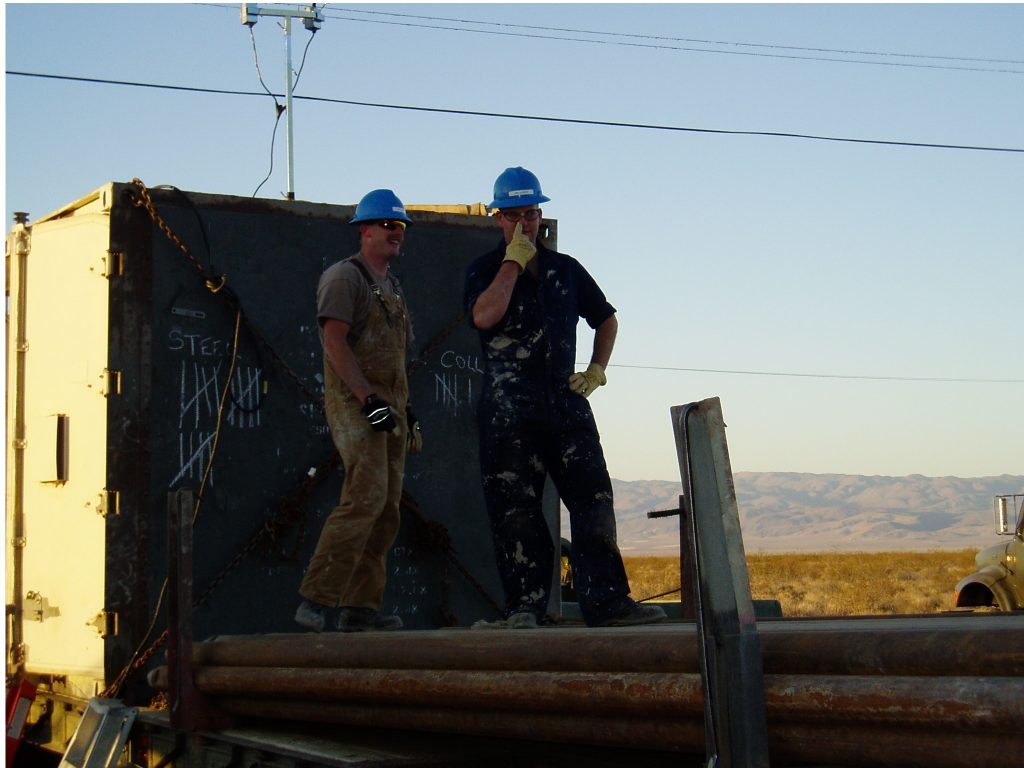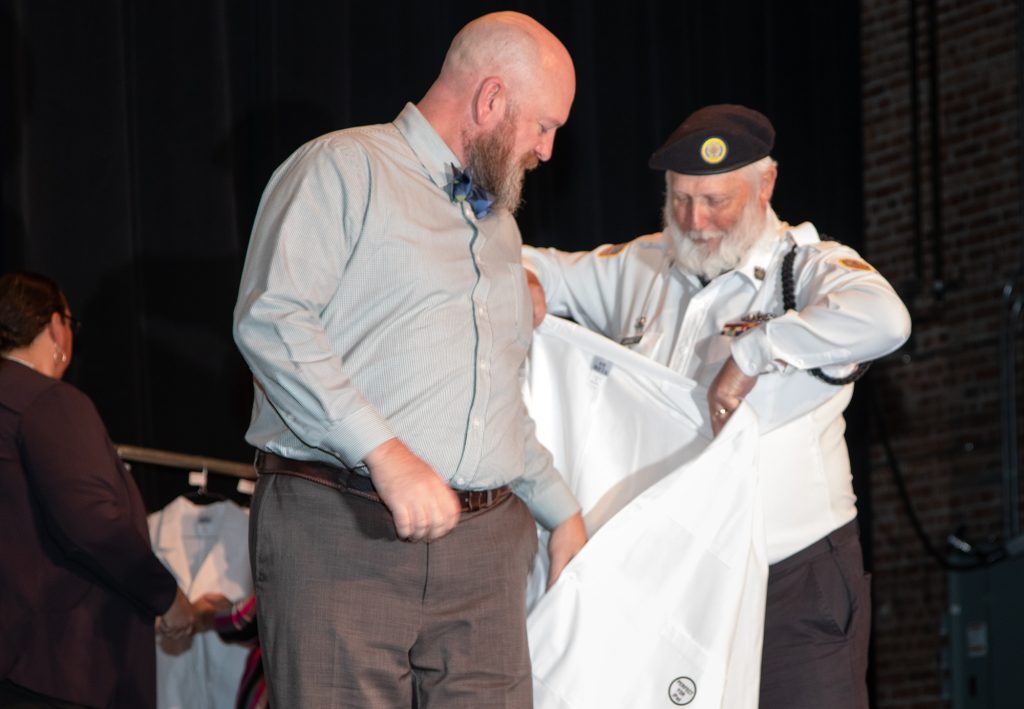Published on
Updated on

Published 11/10/2023
Story contact: Nicholas Childress, CVMMarCom@missouri.edu
John Hansen, third-year student in the University of Missouri College of Veterinary Medicine, is far from a traditional student. Now 48 years old, he grew up in northern California and spent much of his childhood on his grandparents’ farm, where they raised hogs, and tended sprawling acres of almonds, persimmons and cherries.
At the age of 19, Hansen was enrolled in college, paying his own way because his parents had four other children and he wasn’t interested in taking on student loan debt. That same year, he met a military recruiter who explained that his schooling could be paid for in exchange for four years of military service. “I had never intended to be a “lifer” and only wanted to get help with school.” said Hansen. “I originally planned to join the marines, but I instead joined the Navy. This seemed like an easy way out of the long days of working and going to school at the same time. That’s funny to think about now, as I got way more sleep working and going to class than I would during my time in the service.”
In 1994, Hansen joined as a construction mechanic and became part of the United States Naval Construction Battalions, better known as the Navy Seabees. During this time, the promotions he was earning led to more of a managerial role. Hansen said this was a factor in deciding it was time for a change. “I had a knack for fixing things and flew through one promotion after the next,” said Hansen. “With each promotion I moved further from fixing things, into more of a manager role. This, plus the increasing war efforts after 9/11, led me to put my name in the hat for service in the Special Operations Command.”

It took six years, but Hansen was finally accepted and shipped off to Naval Amphibious Base Cornado in California to join Seal Team One. During his time in SOCOM, he primarily provided indirect and supporting fire to cover team members conducting an operation, but his talent for fixing things proved to still be very useful. “When not out on an operation I continued to make repairs and construct improvised equipment to improve our lives while deployed,” Hansen said. “One deployment, I made a heating system and constructed showers. You have no idea how good a hot shower feels after having been deployed for four months and only cleaning with a canteen.”
After 20 years of service and 14 deployments to countries around the world, Hansen decided to call it quits in 2014, when he separated from the Navy. A new challenge arose for Hansen, as he began to navigate life as a civilian. Civilian life was difficult for Hansen at first and he struggled to find his footing. “When I left the service, I had no intention of working at all,” he said. “I wanted to be out in the middle of nowhere and not see another human face ever again. This lasted for around six-seven months, but the desire to do something productive with my life overshadowed my distaste for my fellow humans.”
Hansen’s first venture into the civilian workforce was as a mechanic, but this proved to be unsuccessful, as the competitive environment was too aggressive. After a month or two, he left and began fishing daily, while occasionally looking for jobs online. In 2015, he stumbled across a posting for a kennel tech at a military veterinary facility. “I hemmed and hawed for a while, then decided to drive and check the place out,” Hansen said. “They were so nice, spoke my lingo and the job was to clean up and take care of animals. I was in heaven. Yes, it was a lot of scooping poop, but it was a lot of playing with animals too.”
The fun and relaxing environment was exactly what Hansen needed, but his drive to contribute more eventually took over. This led him to consult the head veterinarian, who set him up to be trained on how to care for sick animals being treated in the hospital. However, Hansen wanted to learn and do more. Eventually, he worked his way to becoming a veterinary technician, but felt that there was always a line that he couldn’t cross. “I could learn, but could never do many things in the hospital,” he said. “The doctors would tell me that if I wanted to do more things I would have to go to school. One day, I got so fed up with having my hands tied and being told no that I put in my notice and signed up for college. The day after I submitted my notice, the doctor told me that he had been waiting for me to do this very thing for several months.”

In 2021, after earning bachelor’s degrees in biology and agriculture at Austin Peay State University, Hansen became a member of the CVM Class of 2025 at Mizzou. He said he never had any intention of pursuing veterinary medicine after the military, but it’s a decision that he is happy with and has helped him develop a new perspective on life. “It just sort of fell into my lap,” he said. “One decision led to another, and I ended up where I am today. In the end it is the people I get to work with and the impact on the communities that veterinarians serve that drew me to this career. Death is an unavoidable part of life, and it is a part of what veterinarians must deal with, but as a veterinarian death is not a malicious, violent act. Death comes from compassion and easing suffering, not creating it like my former life.”
Hansen holds his education in a different light than many of his classmates and feels that it is an advantage to his journey. Being 48 years old with a wife and children, he values his experiences and hands-on learning much more than classroom time. “I have a much different perspective about school than my classmates,” said Hansen. “I am just in it for the fun of learning new things. I have fun, learn cool stuff and keep looking for new things to experience.”

Upon his graduation, Hansen plans to immediately go on vacation with his family. Afterwards, he plans on working in a rural mixed-animal practice until he feels comfortable enough to set up his own practice, where he says he plans to stay until he’s no longer capable of working.
Hansen says that school has been a blessing to his post-military life. “It has completely changed my outlook on the world and myself,” he said. “It has given me a productive outlet to focus my energy. It has given me hope that there is a brighter future for me, where my worth is not measured by the pain I can inflict on people, but rather the comfort I can bring. It has introduced me to a new community where they share similar interests and values. It has shown me a life where there is always more to learn and there is never a line drawn that prevents me from continuing to learn and do more.”